In a dramatic twist following Kendrick Lamar’s Super Bowl halftime show, Lil Wayne has sent a pointed message to Jay-Z, raising eyebrows across the hip-hop community. Kendrick’s performance, which featured a direct diss aimed at Drake, has sparked speculation regarding Jay-Z’s influence in the selection of performers, especially concerning Wayne, who has been a prominent figure in the New Orleans music scene.
 Lil Wayne took to the stage during the 50th anniversary of “Saturday Night Live,” delivering a high-energy performance that reignited discussions about his absence from the Super Bowl. Fans expressed their disbelief on social media, arguing that Wayne, a native of New Orleans, should have been the obvious choice for the halftime show. Many felt that Kendrick’s performance, though viewed by over 133 million, lacked the same energy and historical significance that Wayne would have brought.
Lil Wayne took to the stage during the 50th anniversary of “Saturday Night Live,” delivering a high-energy performance that reignited discussions about his absence from the Super Bowl. Fans expressed their disbelief on social media, arguing that Wayne, a native of New Orleans, should have been the obvious choice for the halftime show. Many felt that Kendrick’s performance, though viewed by over 133 million, lacked the same energy and historical significance that Wayne would have brought.
The controversy deepened when reports surfaced suggesting that Jay-Z had exerted pressure on NFL executives to choose Kendrick over Wayne. Insiders allege that this decision was influenced by Jay-Z’s longstanding rivalry with Wayne, which dates back to their earlier days in the industry. The tensions between the two have simmered for years, and many believe that Jay-Z’s influence was a factor in sidelining Wayne during a pivotal moment in his hometown.
As the fallout from the Super Bowl continues, fans and industry insiders alike have begun to question whether Jay-Z’s decisions were rooted in personal grudges rather than artistic merit. The NFL reportedly even issued an apology to Wayne, acknowledging that a mistake was made in not selecting him for the show. This admission has led to renewed calls for Wayne to be recognized for his contributions to hip-hop, particularly in light of Kendrick’s performance, which some have deemed underwhelming.
Adding to the drama, Nicki Minaj publicly criticized Jay-Z for allegedly punishing Wayne due to past conflicts, while DJ Akademiks suggested that Jay-Z’s actions were motivated by resentment over past diss tracks. The historical context of their rivalry reveals a complex web of competition and animosity, with both artists having made significant contributions to the genre.
As the debate continues, fans are left pondering whether Jay-Z’s decision was a strategic move or simply a result of the ongoing dynamics within the hip-hop community. With both sides having strong followings, the discourse highlights the intricate relationships and rivalries that shape the industry. As Wayne’s message resonates, many are eager to see how this unfolding narrative will impact future collaborations and performances within the hip-hop landscape.

